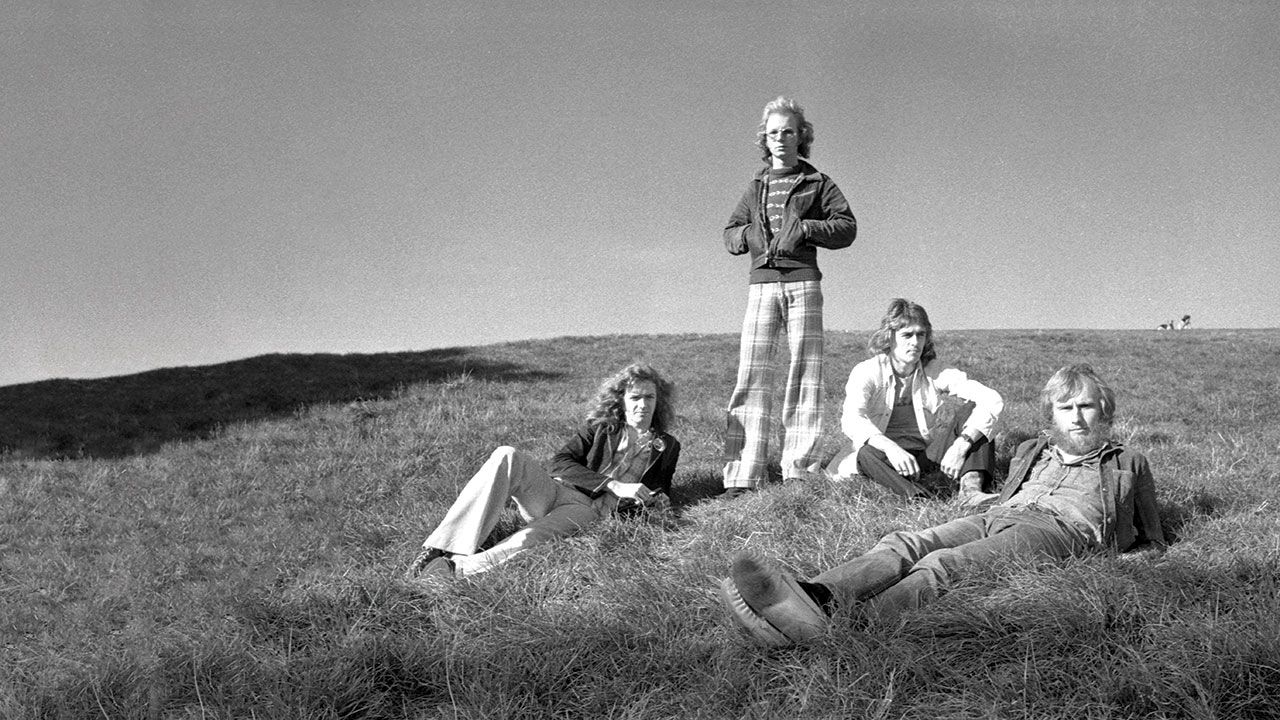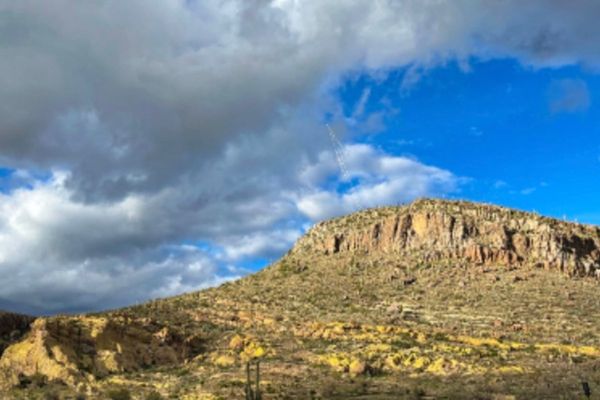
Wishbone Ash didn’t set out to create a progressive concept album – but things took an unexpected twist on their third record, 1972’s Argus. It was reissued and expanded into a seven-disc multi-format box set in 2023, when Prog sat down with Martin Turner and Andy Powell to take in everything from stolen swords and nascent romances to trance-writing and twin guitars.
By the early 70s, under the management of Miles Copeland, Wishbone Ash were two albums into their career and gradually rising – but nobody could have predicted what was to come. Officially formed in 1969, the British blues rockers came into being when former The Empty Vessels vocalist/bassist Martin Turner and drummer Steve Upton hired guitarists Andy Powell and Ted Turner to complete a quartet. They released their self-titled debut in 1970 and Pilgrimage in 1971; but it was 1972’s extraordinary Argus that propelled them to new heights.
“We’d done a couple of years touring the clubs and the town hall circuit in the UK,” recalls Powell. “Then we started playing bigger venues and travelling across the US. We realised that the music needed to be paced differently for those larger venues. And we needed a bit more going for us, thematically, we needed to really define and refine our identity. Hence Argus. We had a plan.”
For Turner, who wrote the bulk of the group’s lyrics, Argus provided the chance to tie several strands together. “We were a well-oiled machine by that point,” he says. “All the themes on that record were things I’d been thinking about for a very long time. For instance, why is it that, since the beginning of time, despots and dictators have managed to harness the energy of young men? Bear in mind that I grew up in the shadow of World War Two. I was absolutely fascinated by that. Also my strange relationship with time, the space-time continuum, which is variable depending on where you are in space. I’ve always struggled with that and tried to break free of that restraint.”
“Martin had lyrical themes in mind that would pique the imagination,” echoes Powell. “Time, space, history, war, peace – grandiose themes. We’d get these fledgling ideas then flesh them out on acoustic guitars. We lived in flats around the Ladbroke Grove area of west London, and we would get together and start working out the arrangements. All the while we’d keep coming back to the plan – imaging this material in larger venues and. We very much realised we needed this new identity to rise above the fray.”
The resultant album was a product of deep thought and reflection. “I wasn’t happy when I’d written the song Warrior,” says Turner, “in case people believed I was advocating for war. I’m a Libran – there’s got to be a balance. I came up with this concept, which was Throw Down The Sword. All of a sudden I had a song of war and a song of peace, with a link in between – the essential balance of things.”
The King Will Come opens side two of the original LP and highlights the collaborative nature of the group’s creative process. “It was done after reading the Bible,” Turner explains. “When I’d written the first verse and the middle bit, I was kind of stuck. So I told Steve Upton, ‘Can you help me out?’ For me, writing is not an intellectual exercise. I was almost doing it on automatic; I’d get into a semi-trance. I’m just a conduit, scribbling it down, and then I’ve got to try and find my way through. Steve set about it a whole different way. He helped me out on that, and he also came up with Leaf And Stream, which is beautiful.”
For Argus, Turner decided the band should tackle a song they previously failed to perfect: Blowin’ Free. “We’d tried to record it before,” says Turner, “but every time it sounded so lame. And I’m like, ‘Guys, you need to inject some life into this. This is a song about teenage love – it’s filled with enthusiasm and excitement.’”
The song was based on a young Swedish woman Turner had met in the mid-60s. “I can remember sitting on Dartmoor in the bandstand with her one day, and there was a thunderstorm that came through the valley down below us. We just sat there for ages watching it. The atmosphere was exhilarating. I plucked up the courage to ask, ‘Do you mind if I kiss you?’ And she replied, ‘You can try.’ I actually included that in the song!”
Although he was delighted with the new recording, the track almost didn’t make the cut. “To my utter horror, later that day or the next morning, the producer, Derek Lawrence, said, ‘I’ve been chatting to the lads about Blowin’ Free. We all agree that your other songs are quite serious and this one’s a bit kind of fluffy and poppy. So maybe it belongs on a different record.’ I went absolutely psychotic!”
In the end, Turner’s passion won out: the song was not only included on the original album, but a 7-inch single version of it is included in the 50th-anniversary edition. As Turner wryly admits: “I was a bit of a dictator when it came to creativity.”
When it came to tackling the musical side in the studio, everything ran much smoother. “We were used to recording quickly and efficiently,” says Powell, “because time was money and so on. The process was very professional – you came in at 10 o’clock and got started. We had a very strong idea of where we were going with the music and the arrangements.”
We were doing our homework before we went to the studio. We weren’t messing about – we knew we were trying to make it
Andy Powell
However, not everything was mapped out in advance, especially when it came to guitar solos. “Those were improvised in the studio, to great effect,” explains Turner. “I just went in there and got a head of steam up in terms of getting inspired. Some of the classic guitar solos on that album – in Throw Down The Sword, for example – I did straight off the top of my head. There was a space allowed in the music. And depending on the quality of the solo, I was allowed to either go on ad infinitum, or just curtail it pretty quickly.”
Powell says it was a case of striking a balance between pre-planning and inspiration. “A lot of the guitar melodies were in my head and then I’d flesh them out with Ted and Martin. It was collective; the whole thing was great. The drum parts, for example, we’d all work with Steve. He’d play the drums, but we’d work out certain fills and arrangements. We were doing our homework, let’s put it that way, before we went to the studio. We weren’t messing about – we knew we were trying to, quote-unquote, make it.”
Much has been made of Wishbone Ash’s twin-guitar harmonies – a novel approach for the time, that actually came about organically. “Ted was always a more ‘feel’ kind of guitar player,” recalls Powell. “He’d often take the more bluesy pieces. I’d be a bit more frenetic and take the faster solos. Tone-wise, we were always aware of things. Martin would interject ideas; we often brough the bass in with the guitar line.
“That’s what makes it so distinctive from, say, The Allman Brothers or Thin Lizzy. Often the bass will be moving up and down the scale, sort of contrapuntal against the guitars. All these processes were put into play in terms of constructing the guitar lines, which were as important as the vocal melodies. I think that’s why people love Argus so much: it was proper grown-up music.”
Their original cover idea was two horses snorting steam, symbolic of the harmony guitars. The second idea was two Italian men kissing
Martin Turner
For the band, the results were worth the effort. “Miles Copeland worked us like bloody rodents,” says Turner. “I put a massive amount of energy into it – nine months of my life. At the album playback, we were in a control room listening to it as a finished thing. I was absolutely overwhelmed with emotion. I wept. It was absolutely wonderful.”
Powell also sensed they’d produced something special. “We knew it was bloody good,” he agrees. “We’d kind of amazed ourselves. We knew we had a vehicle to really fly with. We were very confident.”
The final ingredient was the striking cover, designed by Hipgnosis, but it took a few goes before Storm Thorgerson and Aubrey Powell’s vision for the sleeve met with management’s approval. “Their original idea,” reveals Turner, “was a photograph of two horses – they’d been running, it was a cold day, and they’d be throwing back their heads and snorting steam, symbolic of the harmony guitars in the band. The second idea was for two Italian men embracing and kissing.”
Miles Copeland vetoed both and a decision was finally made to go with the now-familiar warrior. “They managed to get hold of these props from Ken Russell’s movie, The Devils,” says Turner. “They had a spear, a sword and a cape, and they took it all with them to Provence, France, where they could find the light they wanted. They ended up moving a couple of times, trying to find the right position. When they came back, the sword was gone. It was worth a lot of money. They got in big trouble!”
But Thorgerson and Aubrey Powell were displeased with the results. “They felt they hadn’t captured the light they were after,” recalls Turner, “and that when we saw the picture, we wouldn’t like it. But it was quite the reverse.”
The identity of the model who posed with the spear remains a mystery. “I’ve never met the guy,” says Turner, “but I’d love to. He lives in the Welsh mountains, miles from anyone. One day a bunch of lads rolled up at his front door and said, ‘Were you the man who was on the Argus cover?’ They’d managed to figure out who he was and asked him to sign the album!”
Over 50 years on, Powell and Turner agree that Argus – which originally reached No.3 on the UK album charts – occupies a special place in Wishbone Ash’s discography. “These kinds of albums only come along once in a generation,” states Powell. “The mindset, the sound of the record, the way we play the instruments… it’s timeless.”
“It’s got a lovely cohesion,” adds Turner. “We were all in our 20s, we weren’t married or with children, we had the opportunity to be that self-indulgent to devote all our time and energy. Argus was everything I wanted it to be and everyone who contributed had done a very, very good job.”







